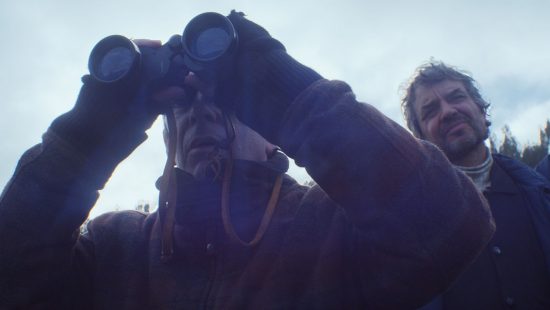Review: The Club
Director: Pablo Larraín
Writers: Guillermo Calderón, Pablo Larraín, Daniel Villalobos
Starring: Alfredo Castro, Roberto Farías, Antonia Zegers, Marcelo Alonso, Jaime Vadell, Alejandro Goic, Alejandro Sieveking, José Soza, Fransisco Reyes
Synopsis: A crisis counselor is sent by the Catholic Church to a small Chilean beach town where disgraced priests and nuns, suspected of crimes ranging from child abuse to baby-snatching from unwed mothers, live secluded, after an incident occurs.
Renowned for his very striking films, Pablo Larraín’s The Club is perhaps his most visceral to date. Despite the main characters being relatively isolated – deemed to live in a state of a moderate house-arrest – there is a transfixing, elemental essence to the religious drama.
What’s noticeable first off, is the immensely involving deep focus lens. Much like No‘s scratchy VHS-like aesthetic, The Club, takes a little while to get used to on the eyes. As a cinematic ploy, it’s incredibly interesting and engaging – drawing you in straight away. The blandness that surrounds the Padres, is something they are all too well aware of, but as an audience, we need to feel this immediately, and Larraín does this masterfully with his cinematography.
The lengthy vistas offer as much mystery as the characters themselves. It’s a mystery that is never completely explored, yet a core aspect of the film, nonetheless. For some, the dull speed and the rather austere environment won’t be enough to thrill. And, in sections, the film does drag. However, the very brooding analysis of disgraced priests is – as the Academy Awards this year recognised with Spotlight – arresting if, at points, sickening.
The violence that occasionally erupts suddenly in Larraín’s films is here quite distressing, and bookends the film. Its employment and placement is smart and expert, leaving you quivering at the thought of mob-rule, morale, and prejudice. At the heart of this narrative is Roberto Farías’ victim, a drunken shell of a man, once robbed of innocence by a priest, and now intent of robbing them of everything. With the inclusion of an investigator, the house-held priests are paradoxically victimised by constant questioning and slurs, as well as scorned upon by the audience, for the knowledge and assumptions we’re gathering. By the end, your trust in any character will be emphatically distorted.
As an ensemble piece, there are only a few actors that stand out (mostly, due to their character’s impact), and as brilliant as the actors are – they seem forgettable, and somewhat indistinguishable. The film, on the whole, is similarly problematic for the way it immerses you. It is very slow, with few characters you feel empathy towards. The lighter moments – with one or two moments of black humour – as well as the more stirring scenes, have you unequivocally transfixed, but are very infrequent. It’s a film that has more art and power than Spotlight, but as a foreign, art-house film, this leaves it as a tough sell. To write effectively about how you feel about it, is almost as emotionally trying as watching the film itself. Questioning the themes and messages, you can also question the film-viewing experience – what to take away, what to react to?











